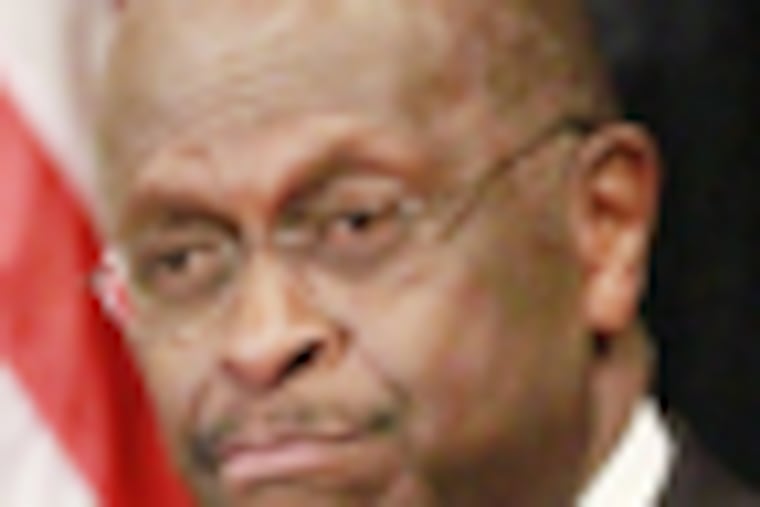Should Cain's fidelity matter?
All along, the Herman Cain campaign - which Politico called "one of the most hapless and bumbling operations in modern presidential politics" - was riveting but improbable. Yet whatever the ex-restaurant executive's other misdeeds and missteps, his bid seems finally to have crumbled because of extensive coverage of a woman's allegations that she had a 13-year extramarital romance with him.

All along, the Herman Cain campaign - which Politico called "one of the most hapless and bumbling operations in modern presidential politics" - was riveting but improbable. Yet whatever the ex-restaurant executive's other misdeeds and missteps, his bid seems finally to have crumbled because of extensive coverage of a woman's allegations that she had a 13-year extramarital romance with him.
Some Cain supporters have cried foul: "Private alleged consensual conduct between adults," said his lawyer, Lin Wood, is "not a proper subject of inquiry by the media or the public."
That's worth examining. Why isn't this private? How much should the media care about a past amorous liaison?
The general argument for exposing personal misconduct is that it sheds light on a candidate's fitness for office.
There's trustworthiness: If he's cheating in private, he'll cheat in public.
There's hypocrisy: The candidate is posing as a moral exemplar while texting his latest squeeze. The hypocrisy rationale is popular among news editors; a survey in the '90s found that while one-third would report a candidate's infidelity on general principle, 94 percent would do so if he had explicitly preached "family values."
There's recklessness, a word used in conversation by one of the Miami Herald reporters who revealed the brazen dalliance of Gary Hart, a Democratic presidential front-runner in 1987: Had he no judgment?
And there's character. Character describes moral worth, a supposedly seamless continuity between private and public selves. The candidate who is the "kind of person" who would deceive a spouse is unfit to serve, not because messing around reflects on dedication and competence, but because high office isn't only a job; it's an honor, which we confer on people not just because they're capable, but because they're deserving.
For its part, the public is conflicted. It doesn't like dirty little secrets, but it doesn't like the media to spend a lot of time ferreting them out. A 2009 Journal of Mass Media Ethics survey found 62 percent believed "it is important that we know about our public leaders' private lives," while 65 percent said the media dwell on them too much.
Surveys in the '80s and '90s found majorities thought infidelity is unrelated to presidential capacity and disapproved of media coverage of it. But the 2009 survey found that tolerance of such coverage rose dramatically between 2001 and 2009. The percentage of people who wanted no coverage of private lives fell from 59 percent to 36 percent, while those who believed it's the media's job rose from 37 percent to 58 percent.
The public expects or at least accepts that the media should "shed light on behaviors and issues that may be perceived as personal, even if this means coverage of tawdry affairs," the authors concluded. So the audience is willing, suggesting market and moral motives for coverage.
But there is another side. After all, it's hard enough for the electoral process to fulfill its minimum civic role - to illuminate public policy alternatives and select people who will handle official duties wisely and effectively - without policing private purity, too.
The notion that private misconduct foretells public performance is appealing, but dubious. The roster of great leaders includes many who were abusive, philandering drunks at home and visionary statesmen at work. Exploring that paradox is what biographers do. Ignoring it is what voters do.
There's a further problem. If the media accept that private sexual misconduct is deeply revealing of fitness for office, they are logically obligated to do far more than give big-time play to allegations. Their duty is to run hard after infidelity.
This would be a front-burner concern. Coverage resources would have to be redeployed. Fairness would compel sexual scrutiny of other candidates. And that would mean a kind of keyhole-peeping, sheet-sniffing journalism well beyond any we've seen in this country, encouraging a redirection of the public gaze that would harm both culture and politics.
I hope we're not going there. But I fear the effect of the Cain campaign is to elevate infidelity as an electoral issue and to move coverage a big step farther from civic purpose and closer to celebrity-mad tabloid TV.